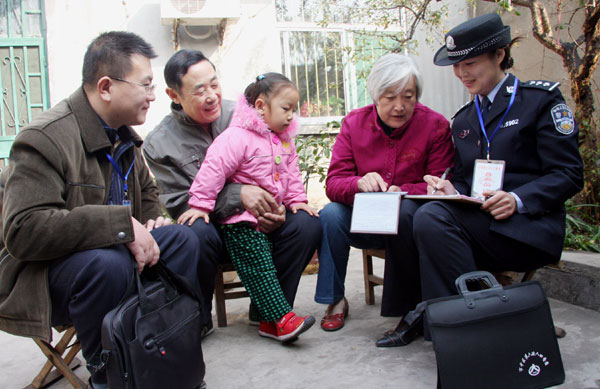China begins population census
Starting Monday, millions of Chinese census takers will fan out across the country, visiting more than 400 million households to try to get an accurate count of the population over a 10-day period.
The sixth census will use about 6.5 million census takers, each dressed in a uniform and bearing a certificate, asking everyone living and working on the mainland to information about their personal lives.
Anyone born before Monday gets included, and anyone born after Monday gets left out until the next one, in 2020, according to the National Bureau of Statistics (NBS).
About 90 percent of the people will be asked to fill in an 18-item form, covering their name, sex, ethnic group, household registration, and education; the other 10 percent, chosen randomly, will be asked to fill in a longer 45-question form.
Foreigners have it easier: they only have eight questions to answer.
One in 10,000 households will be visited again from Nov 11 to 30, with the NBS sorting and filing the data through December. In April 2011, the main census data will be made public.
Around 700 million yuan ($103 million) of central government funds will be spent on the census, according to official figures.
And, if the previous household visits are anything to go by, the census takers will not have an easy job, because many people worry about their privacy, not to mention the rapidly swelling migrant population in major cities.
Many census takers previously found that people simply refused to open their door to them.
According to Tan Bihua, one census taker in the southern city of Guangzhou, where the census started on Oct 25 - ahead of the nationwide effort because of the 16th Asian Games - each person is responsible for about 120 to 150 households and the greatest difficulty is that they often cannot even find the people.
Tan said she had to pay eight visits to one household to get their information because they were migrant workers who had no regular work hours, according to the Southern Metropolis Daily.
In Beijing, most residents received a mobile-phone message over the weekend, asking them to take part in a cooperative spirit.
Vice-Premier Li Keqiang, on Thursday, also asked for people to cooperate with the census takers so that the statistics will be more accurate.
Li promised that any personal information collected will be kept strictly confidential.
If people repeatedly refuse to open the door to the census takers, they have the right to ask the police for help, the Beijing News reported on Sunday.
For foreigners, who are being included in China's census for the first time, special preparations have been made.
Yang Shu, deputy director of the census office of Maizidian, a multinational community in Beijing's Chaoyang district, said their office has recruited volunteers with bilingual or multilingual skills to help with the census. They have also translated the questionnaire into at least five languages, including the usual English, French and German.
"Foreigners' lifestyles are different and sometimes it's difficult to find them, so we suggest they make an appointment with the census takers - a time that is convenient for them," Yang politely pointed out.
China holds its national census every 10 years. The previous one, in 2000, showed that the world's most populous country had 1.29 billion people.
 0
0 







